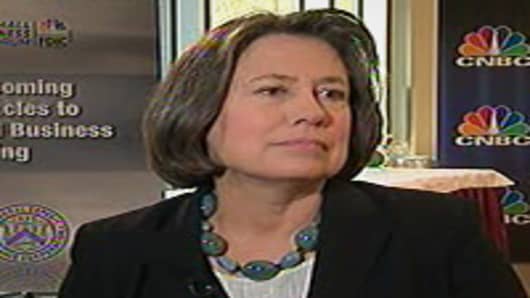The Federal Reserve Bank of New York in 2008, headed then by current Treasury Secretary Timothy Geithner, should have done more to investigate big-bank efforts to manipulate global interest rates, former FDIC Chair Sheila Bair told CNBC.
In the latest salvo over the London Interbank Offered Rate— Libor — scandal, Bair called out regulators who knew of efforts by Barclays and others to drive the key rate lower, but did nothing other than offer advice on how to fix the process.
The New York Fed's role became apparent in a recent document release from the central bank. Transcripts showed Geithner was made aware of, and his office investigated, allegations that the Libor rate was being underreported.
Some 18 of the world's largest banks each night report the borrowing rate they would be charged by their peers. The aggregate number also is used to calibrate other interest rates.
"Looking at those emails, it looks like they had pretty explicit notification of some very bad behavior, and I don't understand why they didn't investigate," Bair said during a "Squawk Box" interview.
She added: "I think they deserve some credit for trying to suggest some reforms. Even those reforms did not attack the core problem, which was that it wasn't a transaction-based survey. It was a judgment survey. But I don't understand they they didn't investigate given what they were being told. I don't understand it, and they did have the authority to do that."
During an interview at the "Delivering Alpha" conference presented Wednesday by CNBC and Institutional Investor, Geithner forcefully defended the New York Fed's actions after it was made aware of Libor irregularities.
“We did the right and necessary thing and we did it early,” Geithner said.
For her part, Bair said she knew little then about the Libor problems.
"What I read in the papers I knew about. I knew that there was a market perception that Libor was judgmental, and it was," she said. "Judgment is one thing, but the kind of really overt rate fixing is something completely different. No, I never knew about that. I don't think anybody did, except apparently the New York Fed."
Bair said the Libor scandal exemplifies the reckless risk-taking culture on Wall Street, something she said remains despite the Dodd-Frank banking reforms that mark their second anniversary this weekend.
Big bank earnings reports so far reflect that institutions are taking substantial hits on their trading desks, despite the reforms.
"There's still a lot of challenges on the horizon, especially on the trading desks of these large financial institutions," Bair said. "It doesn't appear that reform has really taken hold. The culture still seems to be one of excess risk-taking, perhaps ignoring the law if that means they can fatten their year-end bonuses."



